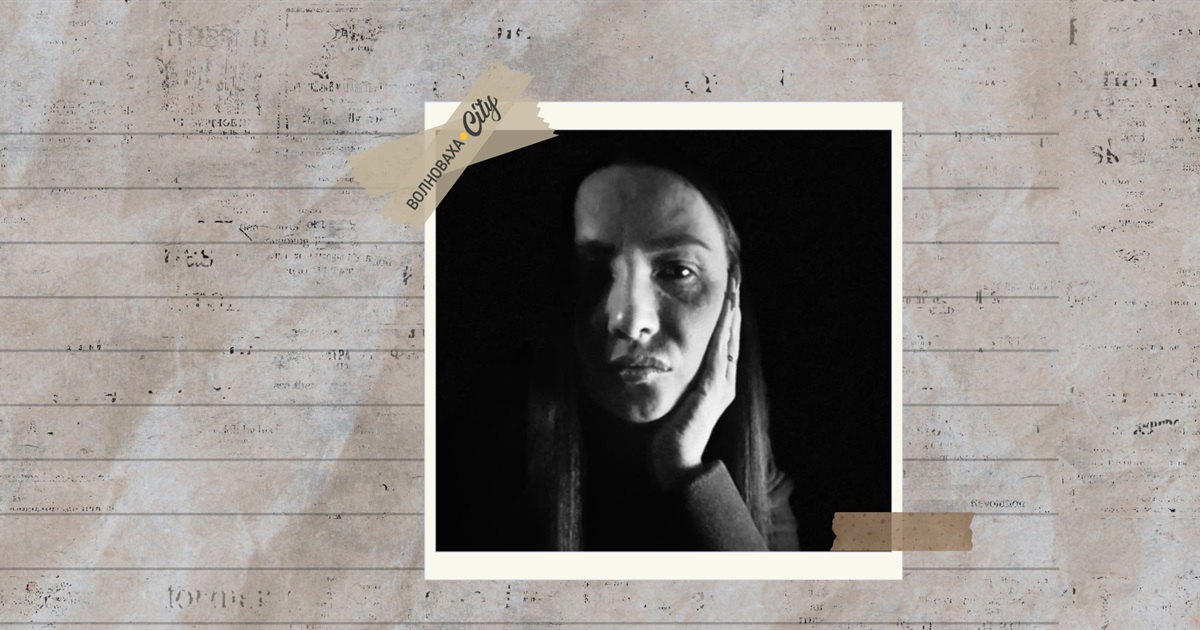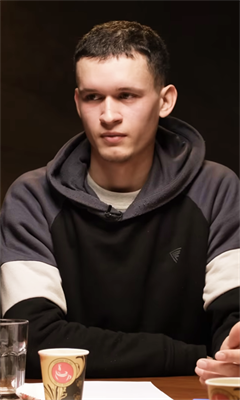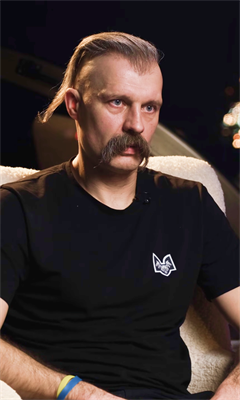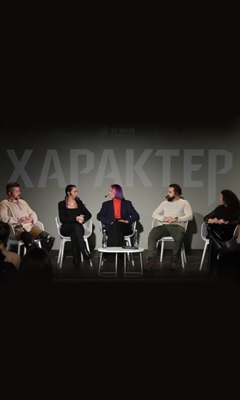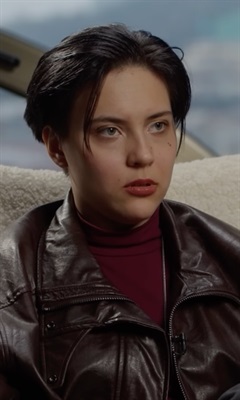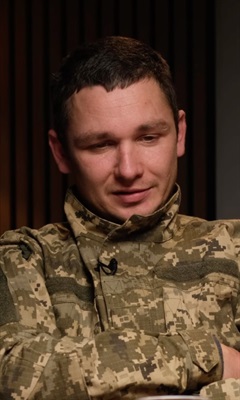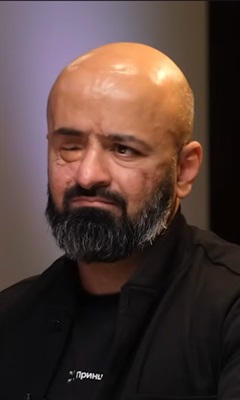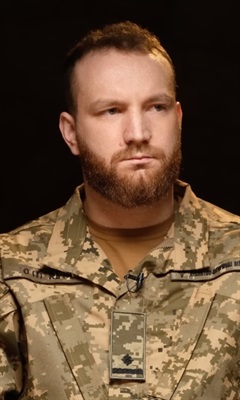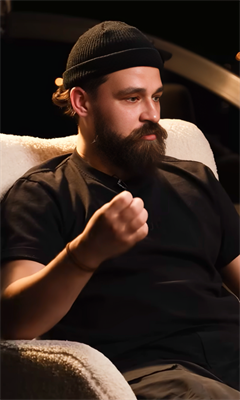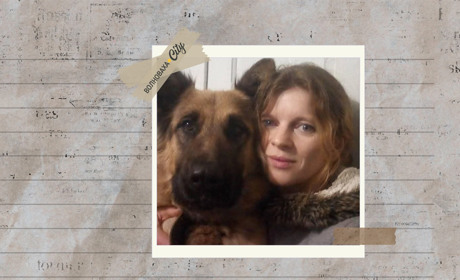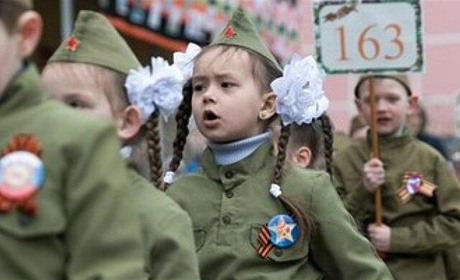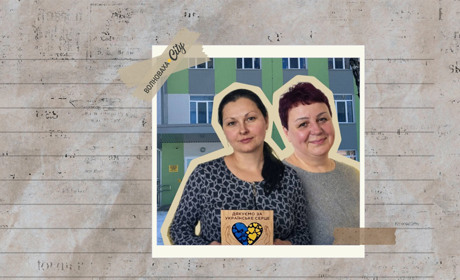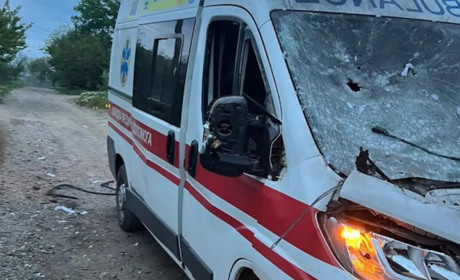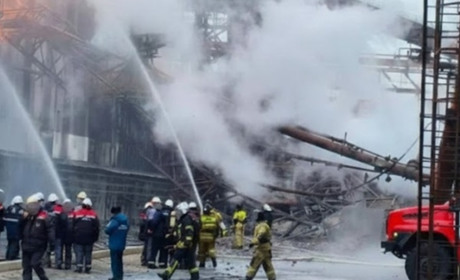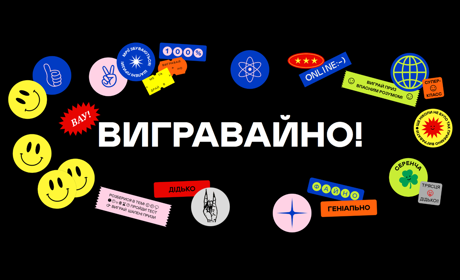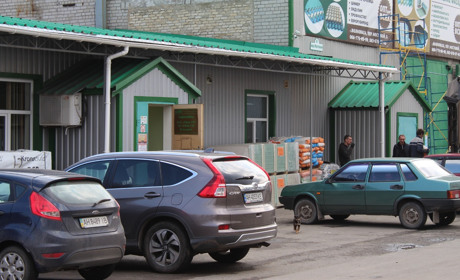Yuliia Dvornychenko spent almost two years in Russian captivity after being baselessly accused of espionage. The woman endured brutal torture in the notorious "Isolation" prison in Donetsk, suffered physical and psychological abuse, and after liberation had to fight for the return of her children from occupied territory. She told Volnovakha.City about the inhumane conditions of prisoner detention, systematic torture, and her current mission — to testify in international courts about Russia's war crimes and to fight for the release of civilian hostages who have remained in captivity since 2016.
Beginning of War and Move to Mariupol
In 2014, when Russian aggression reached Chystiakove (formerly Torez), Yuliia Dvornychenko with her husband and two sons was forced to leave her hometown. The family moved to Mariupol, seeking safety.
"In 2014, when it all started, we moved to Mariupol. There my husband, the father of my children, died. Due to the nervous shock during the relocation, his body responded in such a way that his kidneys failed, then brain swelling followed..." Yuliia recalls.
Doctors couldn't save her husband. According to the woman, physicians prescribed diuretics when medications against swelling were needed. Ten days in intensive care ended tragically — her husband died.
Left alone with two sons, Yuliia didn't give up. The older son Danylo went to school, the younger Mark — to kindergarten. The woman herself found work at a massage salon.
Mariupol Shelling and Return to Occupation
A pivotal moment for the family came in January 2015. Yuliia traveled to Torez to check on their apartment. It was then that tragedy struck — her older son was caught in the brutal shelling of Mariupol.
On January 24, 2015, Russian forces carried out a terrorist attack in Mariupol — a series of shellings of residential areas from the left bank of the Kalmius River. The first Grad strike occurred around 9:25 Kyiv time. The "Eastern" residential district came under fire. Many civilians died.
"I was at home in Torez when they introduced the pass system. A person without a pass couldn't cross checkpoints. And I couldn't leave. My son remained with acquaintances," Yuliia says.
The mother's desperation was so strong that she was ready to walk to Mariupol on foot.
"I went to the occupiers' checkpoint and said my child was caught in shelling. They joked with me saying: if you want — go on foot. And I went. On foot to Mariupol."
Ukrainian soldiers at a checkpoint near Volnovakha didn't remain indifferent to the woman's grief and helped her reach her son by stopping a bus.
"I realized that shelling of Mariupol might continue, so I took my son and cat, and we returned to Torez," Yuliia recalls.
The decision was forced — a single mother lacked funds to rent housing in Mariupol. State assistance for loss of a breadwinner was only 600 hryvnias — an amount insufficient to support two children.
Life Under Occupation
From 2016, the family lived in occupied territory. The children attended school and kindergarten, where the Ukrainian language gradually disappeared.
"In first grade, Mark studied Ukrainian, but in second grade, he switched to studying it optionally. Only three from the class agreed to the optional course, so it was canceled. That is, the child didn't know Ukrainian at all," Yuliia explains.
To ensure her sons saw the differences between occupation and a free country, the family would travel to Mariupol on weekends whenever possible.
"It was our breath of fresh air... One day, returning to occupation, approaching Volnovakha, we looked toward Donetsk, and everything was black. It just so happened there was a thunderstorm, but it was in harmony with our state," the woman recalls.
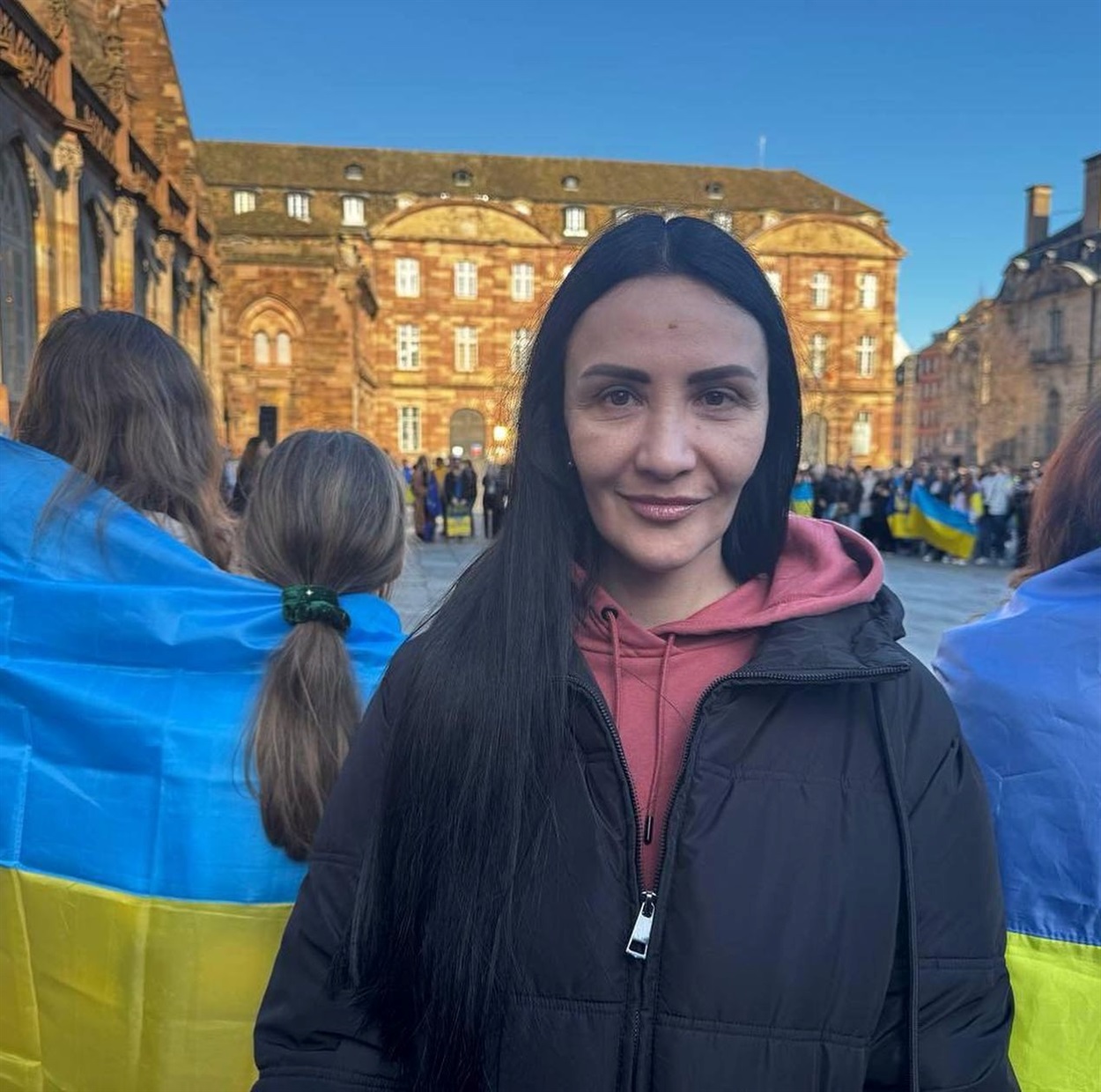 Yuliia DvornychenkoФото: Волноваха.City
Yuliia DvornychenkoФото: Волноваха.City
In Torez, Yuliia worked as a transporter — delivering people through checkpoints from Ukraine-controlled territory to occupation and back.
"I don't have a profession, I finished school and immediately started working. So in 2015, I became a transporter. Some people traveled for pensions, some for parcels, for medications, because they were scarce under occupation," she explains.
In 2019, Yuliia remarried. The couple deliberately registered their marriage in Mariupol, using the "Marriage in an Hour" program, to avoid receiving documents from the so-called "DNR."
"In Torez, they told us: 'You need to legalize your marriage here and change the certificate to a DNR one.' But we still wanted to do it under Ukrainian laws. Because of this, we automatically became 'ukrops' [a derogatory term used by Russians against Ukrainians]," Yuliia explains.
When quarantine came and checkpoints closed, the woman stopped working as a transporter. Her husband found work as a loader at a confectionery factory. The older son entered the Donetsk Institute of Physical Education, while the younger continued studying at school.
Arrest and Captivity
The family's fate turned upside down on March 9, 2021. At three in the morning, representatives of the so-called "Ministry of State Security of the DNR" burst into the sleeping family's home and detained Yuliia along with her husband.
"On March 10, 2021, in the early morning, DNR MSS came to us. They said we were Ukrainian spies and took us captive. We were ordinary civilians living under occupation, not military. And they tell us 'you're a spy,' without a shred of evidence," Yuliia recounts.
According to her, the invaders conducted a search in the presence of neighbors, seized all the family's gadgets and vehicles. When Yuliia asked about the grounds for detention and evidence, she was brutally beaten.
"All the testimony they needed, they simply beat out of me. And the breaking point, after which I could no longer resist, was a 'document' stating that my children would be sent to an orphanage, as they were minors at the time. And of course, as a mother, I would have signed anything just so they wouldn't touch my children. I signed a confession, severely beaten, that I was a Ukrainian spy," the woman recalls.
She believes the reason for the detention was the occupiers' desire to make money.
"At that time, checkpoints hadn't been working for a year. These 'MSS officers' 'fed' off checkpoints. Transporters travel, give them money. They had no income, so they decided to go after transporters," Yuliia explains.
According to her, for each so-called "spy," the "MSS" department received 500,000 rubles. "And there were two of us — me and my husband. So they earned one million on two 'spies,' from whom testimony was beaten out," she claims.
The "Isolation" Torture Chamber
The couple was taken to "Isolation" — the most brutal prison of the so-called "DNR," organized on the territory of a former insulation pipe factory in Donetsk.
"In Donetsk since 2014, there's been a savage prison, just a torture chamber, 'Isolation' at the former insulation pipe factory. There are burial sites for people who couldn't withstand torture. There, people lost their minds," Yuliia testifies.
According to the woman, 99.9% of people who went through "Isolation" experienced torture by electric current, rape, and brutal beatings.
She describes one of the torture chambers: "There's a room called 'ATSKA,' perhaps once it was a telephone station. In the middle of this room is a table with holes along the edges. They would lay a person down, chain them. Completely undress them, put a rag on their face and pour water. When your nose and mouth are covered with a rag, no matter how you try to breathe, this liquid gets into your throat, and you simply drown."
Yuliia also talks about other tortures, including beating with a rubber stick.
"They made it very painful, poked this stick all over your body..." she recalls.
Prisoners were always kept with bags over their heads so they couldn't see their torturers.
"You just have a bag on your head 24/7. If they don't like when you disagree with their proposals, they wrap tape around the bag and start suffocating you," Yuliia says.
A difficult ordeal for her was also hearing her loved one being tortured.
Release and Fight for Children
Yuliia was exchanged on October 17, 2022, as part of a women's exchange. During her absence, her children aged 9 and 17 first lived alone for a month, and then under the care of Yuliia's friend.
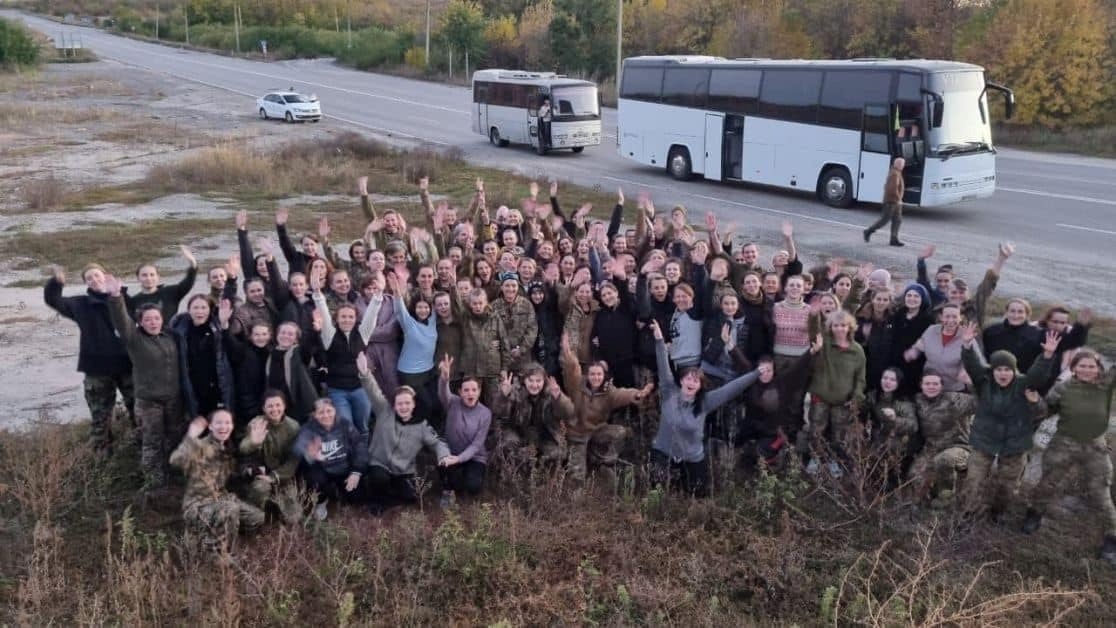 Ukraine was able to return 108 women who were held by the Russians. Photo from October 17, 2022 Фото: Andriy Yermak
Ukraine was able to return 108 women who were held by the Russians. Photo from October 17, 2022 Фото: Andriy Yermak
After release from captivity, the woman had to fight for the return of her children to Ukraine-controlled territory. The Russian side didn't want to release the children, constantly making new "demands," asking for countless documents and certificates. In this struggle, Yuliia was helped by specialists from Ukraine's Ministry of Reintegration.
Eventually, the "long road home" for the children ended successfully. Currently, the family is undergoing rehabilitation, Yuliia is working with a psychologist, although the burden of captivity has left a heavy mark on her well-being.
Testifying About Russia's Crimes
Today, Yuliia Dvornychenko is a member of the NGOs "Come On, Sisters" and "Sema Ukraine," which help women who have experienced violence during the war.
She often travels abroad to bring the truth about Russia's crimes in Ukraine and the conditions of prisoners in Russian torture chambers to the world.
"I was at the Council of Europe, I testified for all prisoners who remained there. Well, maybe not for all, but for those I knew. I said there are many prisoners still from 2016-2017. They're waiting for their exchanges. But there's no mechanism for releasing civilian prisoners specifically," the woman says.
Besides Strasbourg, Yuliia also gave testimony in Germany, showing photographs of those still in captivity. She considers her mission to be preserving the memory of victims of Russian torture chambers and fighting for the liberation of those who are still there.
This material was published with the support of the Association "Independent Regional Publishers of Ukraine" and Amediastiftelsen as part of the Regional Media Support Hub project. The views of the authors do not necessarily coincide with the official position of the partners.





